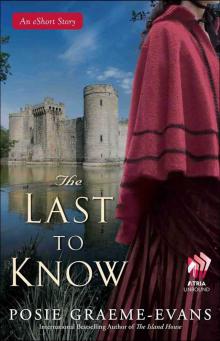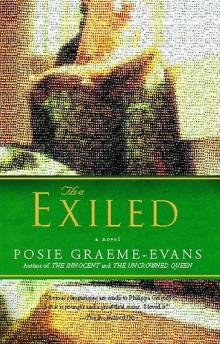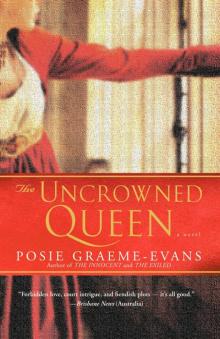- Home
- Posie Graeme-Evans
The Last to Know
The Last to Know Read online
The Last to Know
Also by Posie Graeme-Evans
The Island House
The Dressmaker
The Uncrowned Queen
The Exiled
The Innocent
Thank you for purchasing this Atria Books eBook.
Sign up for our newsletter and receive special offers, access to bonus content, and info on the latest new releases and other great eBooks from Atria Books and Simon & Schuster.
or visit us online to sign up at
eBookNews.SimonandSchuster.com
The Last to Know
An eShort Story
Posie Graeme-Evans
Atria Books
Atria Unbound
New York London Toronto Sydney New Delhi
Atria Books
A Division of Simon & Schuster, Inc.
1230 Avenue of the Americas
New York, NY 10020
www.SimonandSchuster.com
This book is a work of fiction. Names, characters, places, and incidents either are products of the author’s imagination or are used fictitiously. Any resemblance to actual events or locales or persons, living or dead, is entirely coincidental.
Copyright © 2012 by Posie Graeme-Evans
All rights reserved, including the right to reproduce this book or portions thereof in any form whatsoever. For information address Atria Books Subsidiary Rights Department, 1230 Avenue of the Americas, New York, NY 10020.
First Atria Books ebook edition May 2012
ATRIA BOOKS and colophon are trademarks of Simon & Schuster, Inc.
The Simon & Schuster Speakers Bureau can bring authors to your live event. For more information or to book an event contact the Simon & Schuster Speakers Bureau at 1-866-248-3049 or visit our website at www.simonspeakers.com.
ISBN 978-1-4516-9061-3
In this ebook you will find a Reader’s Companion of additional content, including a sample chapter from one of Posie Graeme-Evans’s previous novels, plus a free and exclusive sneak peek at her next absorbing historical novel, The Island House coming June 26, 2012.
From Atria Books
Click through the Table of Contents and enjoy these special bonus features!
Look for Posie Graeme-Evan's new novel The Island House at your favorite eBooks seller!
Posie Graeme-Evans
The Island House
Contents
Introduction by Posie Graeme-Evans
The Last to Know
The Dressmaker excerpt
The Island House excerpt
About Posie Graeme-Evans
About Atria Books
Ask Atria
Introduction
At least once in any lettered career, a writer will be asked, “So tell me. Where do the ideas come from?” It’s certainly happened to me, and not just once either.
And what do I say in reply? As little as possible, and that in a mumble. At this point, too, I shrug. (The word helplessly just came to mind, sticking its hand up at the back of my head. It wants to be included after shrug. Adjectives annoy me. They’re so often right.)
The point is, I don’t know. Writing is a cloudy process, at least for me. But something begins, or turns up, or glints unexpectedly in sun or shadow, and then, infallibly, whole chains of words begin to assemble themselves inside my fingers; I can feel them, swelling and joining up and itching just beneath the skin. They occupy my head, too, to the point I find myself muttering, often to the alarm of strangers, “Coruscate” or “panne velvet” or “papal infallibility.” If I don’t say them out loud, the words can be persuaded to wait—but only for a short period, and mostly with no manners at all—until I invite them to appear on the page. I won’t say it’s an easy process or even well-controlled when the torrent is finally let loose, but some things do seem to write themselves.
That’s pretty much what happened with “The Last to Know.” It was like turning on a tap where words gushed out instead of water because, one day, the voice of a rather spoiled young woman turned up in my head. Her language and her manners were both so formal I knew she just couldn’t be from our time. But I’ve always adored words, and I liked the length and convoluted complexity of her sentences. Convoluted complexity! Ah yes, lots of syrup and fluff in this story, the one sticking to the other (if you see what I mean), but underneath, and this was a surprise, there was a hint of quite engaging malice among the flummery. (There! Who ever uses flummery these days? Or indeed, “quite engaging malice”?) The problem, for me, is that this kind of writing is addictive. Elaborate phrases are just like the very best olive oil. Thick, satisfying, mouth-filling, and with just a hint of pepper or unexpected bite. And they enhance the flavor of so many other things, depending on where you put them . . .
And what I didn’t know then was that this short story, which was such fun and so fast to write, would give me a way into the world of The Dressmaker.
If you’ve read any of my other books, you’ll know it’s not hard to see that I love frocks and fabric. And “The Last to Know” gave me such an opportunity to use the clothing of the time—the 1850s in England—not just as a way to decorate the story but also as a way into understanding the character and place in society of our heroine. Elinor Fairfax is not as insensitive as she might first seem, just young, but her short, sharp lesson is that life is not about the surface; the fabric can, quite literally, be ripped apart to expose what’s underneath. And the diversion of the clothes described in the story can, in my terms, be quite poignant. From time to time they’re my way into the rigid class system of the era, a class system that stifled so many lives.
And, as it turned out, that element was taken up and amplified in The Dressmaker. For some reason I don’t understand, I’m drawn to “against the odds” stories. And Ellen Gowan’s story—she being the dressmaker herself—tracks her rise from poverty to success and much more, through the clothes she learns to make and sell to the aristocrats of England. Learning to use her talent, persevering when all seems more than lost, brings her through to happiness at last. So though I do not plan these things, certain themes turn up quite a bit in my stories. It seems I’m fond of people—women, really—who just keep going, who survive through persistence and the sheer tensile strength of their will. Ellen is that kind of person. So, too, in the end, is Elinor Fairfax. She won’t settle for second best, and that’s a tough call in her society and ours, but I actually quite like her for making that choice.
I think she became quite a formidable old lady. I find I like formidable in women. There’s not enough of it around.
Posie Graeme-Evans
Tasmania
The Last to Know
All Hallows Eve—October 31
My dearest Louisa,
Forgive this directness in writing to you of tragic events from long ago, but I am close, now, to the natural term of my days. That being so, there are matters of which I wish to dispose, and this letter to you is one of them.
Further, I have chosen this day of all days in the year, for, traditionally, the Eve of All Hallows is when the dead are said to rise from their graves to haunt the living with knowledge of past sin.
I shiver when I think of such judgment, for once I was forced to become part of something that the world would certainly consider sinful. However I now believe that I have come to a different understanding of what transpired then, though, sometimes, when I am alone and the night is very dark, I still experience doubt. Perhaps this letter will allow me to resolve my lingering uncertainty . . .
Do you recall, dear Cousin, the question so persistently asked of me at our second London season? I am certain that you do. My friends, and you were amongst them, implored me to say why I had changed so suddenly from the carefree,
ardent spirit I had once been to the quiet, reflective person I became, the girl who no longer cared to dance. And I have always resisted giving an answer—which you must have wondered at.
However, as I shall relate, a recent communication permits me to lay down the burden of certain appalling secrets, secrets that were not mine to share. And perhaps, in so doing, I may find a measure of peace, since I am haunted still by the sadness of the terrible things I saw and heard.
One thing I ask. Refrain from judgment if you can until all the facts have been laid out before your eyes; then you may make of them what you will. Custom binds us still, I know, and society turns on those who flout its laws. Therein is much human happiness destroyed.
But, as the common saying has it, to begin at the beginning. Permit me to take you back, in mind at least, to when you and I were girls of but eighteen.
One afternoon in late September of that year, I received an unexpected invitation. An invitation that was to alter the course of my life and was, perhaps, the principal cause of my never marrying, though, as you know, I have been most frequently asked.
A girlhood friend of my mother’s—a famous hostess but a lady whom I had never met—had suggested that I, as my mother’s eldest child, might enjoy visiting her family’s seat in the North. In short I was invited to be her guest and companion for a month before the rigors of the London Season commenced.
If it seemed a slightly odd request, arriving unsought and unexpected, that was soon explained away. My mother remembered her old friend as a generous and charming person who had famously married into a wealthy and ancient Yorkshire family. No doubt this kind invitation to me was intended as a way of rekindling their formerly close relationship. And if that were so, I was delighted to be singled out as the means to that end.
In town, as I am certain you will recall, ours was a busy household. And, with a constant round of entertainments to organize—my father’s political career was then at its zenith—and a large establishment to supervise, my mother must have been very glad of an offer which would remove even one of her children from beneath her roof for some few weeks. Thus, in short, my father dispatched an acceptance by the fastest post that could be arranged, and I became the envy of my younger sisters and brothers, since I was so favored by our mother’s mysterious friend.
However, I believe that the story truly began, as many odd things do, in a way which seemed entirely trivial, if inconvenient, at the time; a stranger spoke to me on the train as I traveled north to my intended destination.
He said, “I have always obtained singular pleasure from such a conveyance as this is.” Reluctantly, I surveyed the gentleman on the seat opposite mine. I had not observed him closely before that moment as I was too surprised by his being there at all; however, it was impossible that I should entirely ignore him in such a confined space.
His was a most striking demeanor. He had a high, vivid color and rather brown skin—from the sun of faraway places perhaps; his glossy black hair was certainly pomaded. So brilliant was its shine that it put me in mind of a well-groomed horse (absurd, but the image stays with me still). And yet his glance was restless, and he, himself, seemed restive also. However, it was with a certain flourish that he disposed himself against the squabs—one elegant knee slung across the other, one glove on, the other off, the silver-topped cane in his hand used for punctuation as he spoke.
Do you know, I recall my unspoken indignation still? It seemed to me that he felt the most perfect right to be in that carriage compartment: the compartment which had been reserved for me and me alone (if one were not to count Jane, my maid).
It was at Furneau Minor, a village amongst the high sheepfolds of the Yorkshire Moors, that this unexpected gentleman had flung an expensive if shabby leather valise into the luggage rack above my head as the train lurched away from the platform. He sat before I could protest at the intrusion, confidently leaning across the little space between his knees and my own. Raising his hat, he smiled most directly into my eyes. I was confused by his arrival and insulted by such easy familiarity.
I pressed the bell to summon the conductor, but, once that flustered man arrived, he insisted, though apologetically, that the stranger had a valid ticket and must be permitted to retain his seat.
My unsought companion proffered a small printed card for inspection. The seat number was clearly marked upon it, as was the compartment and the carriage. The booking office at Waterloo had, it seemed, made a mistake, and though the conductor was embarrassed by such an occurrence, he respectfully pressed the point. A valid ticket and a full train settled the matter in his eyes: the stranger had a right his place.
You will recall, Cousin, that I was never described as shy in my youth, and thus, in consequence, I questioned the hapless railway official with some asperity, but at last, the conductor shrugged. Though he was embarrassed, that shrug said he was a man much put upon by the authorities and there was nothing to be done. I regret, still, that my response to this spinelessness was overwarm.
The stranger broke in to this exchange. Perhaps he meant to be amusing. “You see? There is no help for it. We must become traveling companions, dear lady.” Dear lady? I was not my mother, I was a girl of less than twenty. I found his tone insufferable, his roaming eye impertinent. Taking advantage of the gentleman’s remarks to me, the conductor retreated with dispatch, bowing. And I? Since there was no help for my situation, I, too, retreated from the fray; dignified silence became my traveling cloak. It was then that the stranger ventured his remark about train travel. He was determined to persist.
I limited my acknowledgment to the smallest, the most rigid, of nods and fastened my eyes to the pages of my book. We had not been introduced. How could we be? There was no one suitable to advance the acquaintance.
The gentleman appeared to accept this most plain of hints, and the fingers of one hand danced on the windowsill, beating out the rhythm of the iron wheels beneath us. Frowning, he gazed out upon the passing moors in silence until, after some moments, he stripped off his other glove with an impatient sigh. Light caught at the ring on the smallest finger of his left hand: a bright and momentary glint. I remember thinking it to be the very signal and marker of this man: a faceted stone in a gentleman’s signet? Vulgar and ostentatious.
Ah, Cousin, I am certain that I see you shake your head. You are correct. I understood very little of the world in those days and was, perhaps, overcensorious. I am a little wiser now, I hope.
Time passed, and at length the stranger could not contain himself. Impulsively, he spoke again. “Riding upon a train, such a very convenient inspection of the countryside is afforded. And without the tedium and inconvenience of coach travel. Would you not agree?”
Jane, my maid, was absent from my side since I had asked her to obtain some India water from the steward and she had not returned. If she had been present, I am certain that this further remark would not have been ventured; a lady alone is so very vulnerable. Wordlessly, I glanced at my unsought interlocutor with a gentle frown.
A small digression. Perhaps you will recall, Cousin, that my mother would instruct us, before a party, on the subject of the expressions? “Girls, use your faces as little as can be contrived. If you do not smile or frown excessively, the skin is preserved even to old age. And, always remember, a lady should be grave and sweet. Restraint in all that she does is the hallmark of good family. I have always felt that absence of such a quality as this is first signified in the muscles adjacent to the eyes. Men of sensibility and worldly experience will note such a sign on a girl’s face. Note well, and pass by.” Ah, restraint. I am old now, but perhaps, if I had been a more attentive daughter, my skin would better display the fruits of my mother’s advice.
At that time, however, my expression was severe, and a gentleman of sensibility, I felt, would have respected what lay behind it. But this person, it seemed, was not sensitive. His lips quirked. I attempted froideur and failed; my voice trembled. “Sir, I can have no opinion in
this matter, for I am reading my book.”
Certain I had sounded snappish—never an attractive quality—I retreated in confusion to the page before me. I was attempting to make sense of a volume of sermons from the shelves of my father’s library; he had given it to me so that I should be reminded, amongst strangers, of the unchanging moral obligations of a lady of good family. I held the book higher so that my unsought traveling companion might see the title on the spine, Half Hours with Great Minds; Christian Precepts at Work in the World, yet the wretched thing quivered in my fingers.
With dread I felt a familiar heat mount past the embroidered collar of my pink and gray silk traveling ensemble. My face became hot with rage and shame, a certain match for the hue of my gown.
Perhaps, Cousin, you might recall this particular toilette? It seems to me that I can see you before me now on the day when first I wore it. It was during our first Season of the previous winter, and I was much complimented on its cut and color—though not by you, I think? Yet, I have ever prized your directness; currying favor by flattery is nothing to me, nor ever has been.
Now, that particular dress had long been a favorite of mine, and as I set out for Yorkshire, my mother declared that, though London had seen a little too much of my “pink and gray,” it should still serve for the Provinces. The gown would be unfamiliar there and the cost of another traveling costume thus avoided. This was a consideration since my younger sister Charlotte would remove from the schoolroom in the coming winter. Two girls “out” in society and the expense, as we know, is considerable.
Yet here I was traveling in the late warmth of an Indian summer and wearing a costume created for cooler days. Thus it was not emotion alone which provoked my blush, though I was becoming hotter by the moment beneath the perusal of the stranger. Worse, in my agitation, I apprehended that the ostrich feathers affixed to my bonnet must be quivering, for the gentleman directed his eyes to a point above my head. He shook his own as if awed—or, possibly, confused.

 The Last to Know
The Last to Know The Exiled
The Exiled The Uncrowned Queen
The Uncrowned Queen The Island House
The Island House Wild Wood
Wild Wood